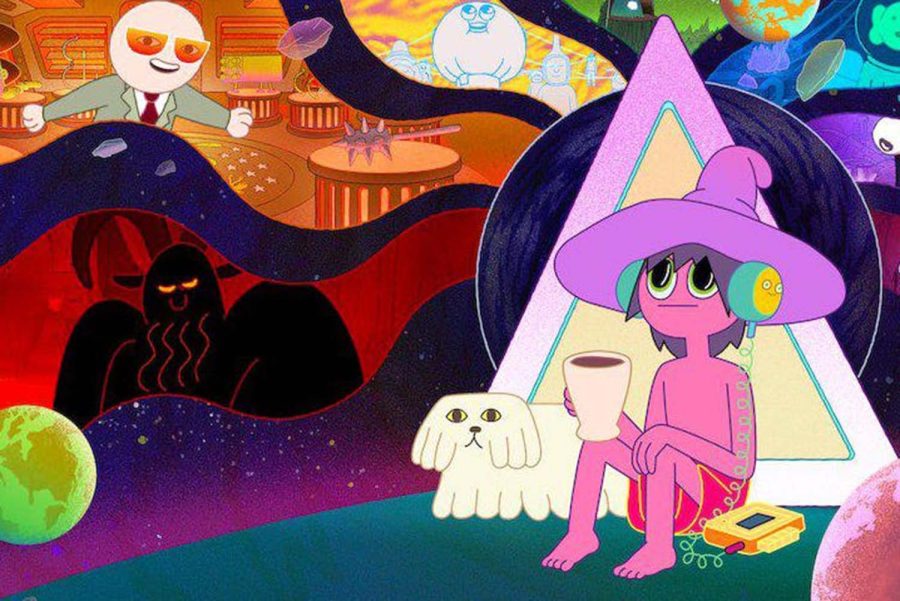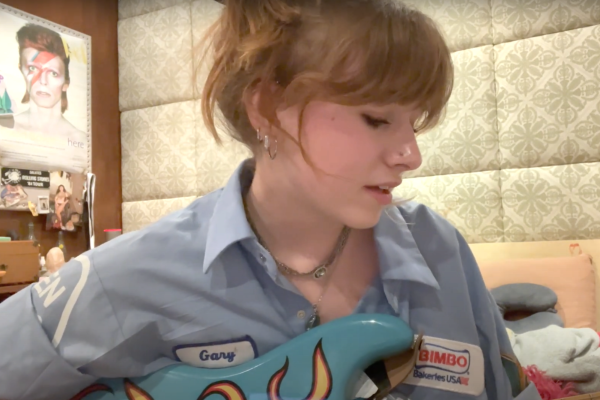Review: Animated series ‘The Midnight Gospel’ teleports you to another dimension
Photo credit: Netflix Promotional Images
“The Midnight Gospel” series consists of eight episodes and delves into important topics connected to spirituality. Clancy, the main character, sits with his pet, Charlotte. “When we set an intention, somehow the world seems to magically come to meet us,” Trudy the Love Barbarian said.
Disclaimer: “The Midnight Gospel” is an adult cartoon series on Netflix that may not be appropriate for all viewers. This review and the show make references to sex, violence and graphic language. Common Sense Media estimates it is appropriate for ages 17+.
Hinduism. Spirituality. Meditation. Death. Rebirth. Substinent concepts like these are a constant in Netflix’s animated show “The Midnight Gospel.” But what if I told you that these meaningful topics are accompanied by insane, psychedelic visuals, trippy storylines and weird-talking beings, some human and some not?
Yet the show has more complex roots than simply dialogue and cartoons. Comedian and conversationist Duncan Trussell is most well known for his honest, hilarious and sometimes heart-wrenching podcast “Duncan Trussell Family Hour.” Animator Pendleton Ward has been the brains behind many projects, the most famous one being his cartoon “Adventure Time” featured on Cartoon Network. The two great minds worked together to shape a show that is not only entertaining but also purposeful. Using eight of Trussell’s podcast episodes as dialogue, Ward curated trippy cartoons to perfectly match the topics of conversation.
The logistics of “The Midnight Gospel” go beyond genius and result in powerful messages diffusing into the viewer’s brain. When you listen to a podcast, your eyes wander. When you watch a cartoon, your mind wanders. By combining the two — podcast and cartoon — viewers are hooked. This is why the foundations of the show are so efficient in delivering messages of healthy coping mechanisms, vulnerability and connecting with others.
Now, I would be lying if I said that the show isn’t weird. Like, really weird. Viewers follow the main character Clancy Gilroy who lives in a colorful dimension called “The Chromatic Ribbon.” Clancy is a spacecaster (video podcaster in space) who interviews a new character in each episode. But, in order to meet these beings who all come from different walks of life, Clancy uses a simulator to venture into new worlds. Each time Clancy simulates to a new planet, he chooses a new avatar that his computer generator customizes just for him.
From guests like Trudy Goodman, the founder of large meditation center InsightLA, to David Nichtern, a senior Tibetan Buddhist teacher and Emmy award winning composer, there is never a dull episode of this series.
Goodman (a.k.a Trudy the Love Barbarian) is featured in episode four entitled “Blinded by My End.” The conversation between Clancy and Trudy is centered around forgiveness and what it means to forgive someone and genuinely mean it. Difficult obstacles in life, like staying present, maintaining empathy and surviving your lowest lows, are all discussed throughout the 30-minute episode.
Nichtern (a.k.a Dave) is Clancy’s guest in episode six: “Vulture With Honor.” Clancy learns the fundamentals of mediation from Dave, understanding the importance of three principles: silence, stillness and spaciousness. Dave explains how the concept of presence and creating distance between you and your thoughts allows other people in.
This is just a sneak peek of two out of the eight episodes of this show. Intriguing, right?
But the last episode in the series called “Mouse of Silver” is what solidifies the show’s place in my heart. Trussell’s mom, Deneen Fendig, passed away due to terminal cancer in 2013. Just two weeks before her death, she and Trussell recorded a podcast episode about death and its implications. This episode is the longest and always hits me the hardest.
There is a plethora of incredible topics within this episode, but there is one that really sticks with me: Fendig explains that we have such negative connotations toward death, often thinking of sorrow, depression and anger. In reality, our reactions to someone dying stem from a place of love. You miss someone so much that you cry. You love someone so much that it pains you to be without them. Everyone is going to lose someone they love at one point or another. Fendig explains that this is a universal aspect of the human experience, which is inescapable and shouldn’t be perceived in such a diluted manner.
In the last minutes of the episode, and therefore the series, Clancy’s mom elaborates on the connection between love and death.
“I may leave this plane of existence sooner rather than later,” Fendig said. “But, the love isn’t going anywhere.”
It is an understatement to say that this episode changed my life, and every other episode has aided in me becoming a better, more open person. Everyone should find a spare 20 minutes to watch one of the episodes; you won’t regret it.
-
Depth
-
Humor
-
Overall message
-
Enjoyment
-
Animation
Summary
“The Midnight Gospel” is an eight episode animated series on Netflix. The show discusses a multitude of topics focusing on the self, and more importantly, self improvement. From meditation to forgiveness, the show uses powerful dialogue along with crazy cartoon visuals to convey messages.

Chloe Fidler joined the Oracle as a staff reporter in 2019, became the Voices Editor in 2020 and continued that role through her senior year. Passionate...





![Freshman Milan Earl and sophomore Lucy Kaplan sit with their grandparents at Archer’s annual Grandparents and Special Friends Day Friday, March 15. The event took place over three 75-minute sessions. “[I hope my grandparents] gain an understanding about what I do, Kaplan said, because I know they ask a lot of questions and can sort of see what I do in school and what the experience is like to be here.](https://archeroracle.org/wp-content/uploads/2024/03/grandparents-day-option-2-1200x800.jpg)

























































